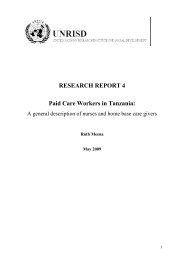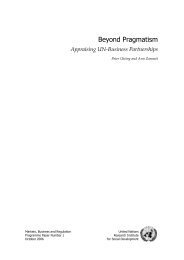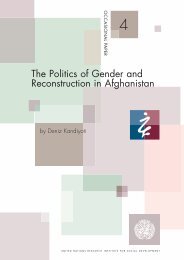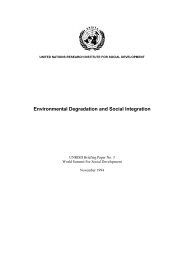Women's Employment - United Nations Research Institute for Social ...
Women's Employment - United Nations Research Institute for Social ...
Women's Employment - United Nations Research Institute for Social ...
Create successful ePaper yourself
Turn your PDF publications into a flip-book with our unique Google optimized e-Paper software.
Women’s employment in the textile manufacturing sectors of Bangladesh and Morocco<br />
tried to fire union leaders with packages of three months’ wage<br />
compensation. However, in some cases where the unions were very<br />
strong and the general workers were united, the owners either<br />
declared a lock-out of the factories or met, at least <strong>for</strong> the time being,<br />
some demands of the workers.<br />
b. The owners’ attitudes toward trade unions<br />
Irrespective of their educational, socio-cultural and economic<br />
background, most of the garment factory owners seem to have a very<br />
negative attitude toward the existing garment federations and their<br />
affiliated unit unions. The root cause of this negative attitude seems<br />
to be grounded in their perceptions of trade unionism which, again,<br />
emanates from what they have seen of the activities of the trade unions<br />
in the public sector. According to most of our respondent owners, the<br />
Bangladeshi entrepreneur involved in RMG industries at the moment<br />
faces a few common labour-related problems. These are: 1) lack of<br />
discipline among workers, 2) workers not committed to productivity,<br />
3) illegal and unreasonable demands placed by representatives of<br />
garment workers, 4) an unfavourable labour code that specifies<br />
privileges but does not spell out duties of workers, 5) politicization<br />
of trade unions, 6) multiplicity of federations and unit level unions,<br />
and consequent rivalries between them, and 7) too many work<br />
stoppages.<br />
Under these conditions, according to some of our respondent<br />
garment factory owners, the situation is not yet ripe to allow fullfledged<br />
unionism in a nascent industrial sector like RMG. However,<br />
three of our respondent owners claimed that they would have no<br />
objection to unit unions if they were <strong>for</strong>med independently, and not<br />
through what they called the instigation of outsiders or “professional<br />
trade unionists”. But be<strong>for</strong>e these unions are <strong>for</strong>med, the workers must<br />
be properly educated regarding existing labour laws, basic rights,<br />
and inalienable obligations so that they cannot easily be manipulated<br />
by “professional unionists” with vested interests. These owners<br />
suggested that NGOs might like to develop awareness-building<br />
programmes <strong>for</strong> female garment workers which could provide<br />
education about their legal rights. They also suggested that there<br />
should be provision <strong>for</strong> on-the-job training programmes <strong>for</strong> garment<br />
workers but that these should be linked to their duration of service.<br />
Most of our respondent owners admitted that many garment<br />
factories do not have a proper working environment and adequate<br />
facilities <strong>for</strong> workers. But <strong>for</strong> that they squarely put the blame on the<br />
“corrupt” inspectors from the office of the Chief Inspector of Factories<br />
208
















